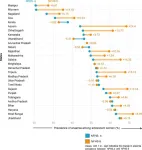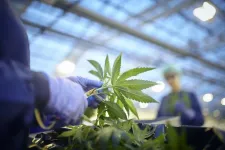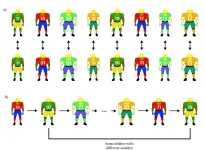(Press-News.org) Barriers to accessing potentially life-saving support persist, according to new research into suicidality in the LGBTIQA+ community.
An RMIT-led study with Switchboard, Roses in the Ocean and University of Sydney interviewed members of the LGBTQA+SB community to understand their lived experiences of suicidal thoughts and behaviours, and uncover factors that protect people at these times of distress.
The acronym SB in LGBTIQA+SB stands for sistergirl and brotherboy, acknowledging the trans women and trans men of First Nations gender-diverse people within some, but not all, Aboriginal and Torres Strait Islander communities.
Project lead and Dean of RMIT’s School of Global, Urban Social Studies, Professor Katherine Johnson, said despite LGBTIQA+ Australians being 20 times more likely to have considered suicide, there remained a lack of research into the types of support needed, especially for people with intersecting identities, including First Nations people, people of colour, and people with disabilities.
Many participants in the study said their suicidal distress started at an early age with fluctuating levels of intensity.
Alarmingly, it also found concealing this distress, or not accessing support, was common among younger people.
It echoes a previous study revealing almost 2/3 of LGBTIQA+ people in Australia aged 14 to 21 did not access professional support after experiencing some form of suicidal distress.
Barriers to accessing support
Johnson said people in LGBTIQA+ communities often embodied several marginalised identities, which can create unique and complex systems of disadvantage and discrimination.
“Understanding the context in which LGBTIQA+ people attempt to live affirmatively must be the starting point for effective policy and services,” she said.
As well as fear of discrimination in terms of sexuality, gender and racism, barriers to accessing support included a lack of knowledge of where to find it, cost and distrust of the health system due to negative medical experiences.
Concerns around confidentiality were also complex, especially for First Nations people, people of colour and religious participants in remote and rural communities.
Some participants were uncomfortable seeking support services where they were too easily identifiable.
Understanding help-seeking behaviour
Johnson said seeking support was a challenge overall, but her research found help-seeking behaviour often changed over time, with people becoming more adept at finding ways to manage their suicidal distress.
While gender identity and sexuality played a part, participants said it was fears of social and cultural isolation and rejection associated with homophobia, transphobia and racism that were the main contributing factors in their distress.
“Living with suicidal distress is exhausting. It can limit people’s ability to form and maintain social connections and significantly disrupt daily life, which may lead to other psychosocial factors like homelessness and unemployment,” said Johnson.
“That’s why we need targeted early interventions in order to reduce suicidality over an LGBTIQA+SB person’s lifetime.”
Johnson said the lack of support services in remote and rural areas can also be isolating as it forced people to travel to more urban areas to access support.
“Developing referral pathways, reducing out-of-pocket expenses and ensuring LGBTIQA+SB affirming services are available, particularly in regional areas, will facilitate access to safer and more effective supports,” she said.
Family relationships, friendships and supportive social spaces were significant sources of acceptance and affirmation for LGBTIQA+ people. However, Johnson said they could also be drivers of distress and shame, shaping how people reach out for help.
“We found family support was vital, but it was not always available or positive,” she said.
“Meanwhile, participants of colour often sought support from friends due to family being overseas.”
Johnson said employing a diverse representation of LGBTIQA+SB peer workers, including First Nations, people of colour and people with disabilities, within mainstream and queer-friendly services can help improve perceptions of safety and confidentiality.
“Rainbows are nice, but people like to connect with others who understand the nuances of their identity, circumstances, background and culture,” she said.
“With appropriate and effective support, LGBTIQA+SB people can, and do, find ways of living with suicidal distress.”
More work needs to be done
Johnson said this research is just the beginning of a bigger call for more attention to the lived experiences of suicidality in diverse LGBTIQA+SB communities.
RMIT’s Social Change Enabling Impact Platform has funded the translation of Johnson’s research into training materials. Switchboard will help fund the roll-out of the training across Victoria.
Switchboard CEO Joe Ball said he would like to see national investment to introduce the training around the country.
“The potential impact of our suicide prevention training cannot be overstated — this has the power to change lives, and we welcome strong partnerships to do this work together,” Ball said.
“LGBTIQA+SB people, no matter who they are or where they live, deserve tailored support.
“The time is well overdue for more sophisticated approaches to supporting our communities. We are not one-dimensional people — we live intersectional lives and deserve support from services that acknowledge and strengthen this.”
Co-author and University of Sydney and University of New South Wales Adjunct Professor Vanessa Lee-Ah Mat said the research is laying the foundations in understanding queer First Nations suicidal behaviours from their lived experiences.
“Putting culture first has been a guiding hand,” said Lee-Ah Mat, a Yupungathi and Meriam woman.
“The insight drawn from this research has enabled us to begin to understand the many experiences that lead to depression, anxiety and suicidal behaviours in Aboriginal and Torres Strait Islander LGBTIQA+SB people.”
Co-author and Switchboard Suicide Prevention Manager Anna Bernasochi said the training to be rolled out was the first of its kind to use insights from lived experiences of LGBTQA+SB people.
“By integrating insights from these lived experiences, services will be more equipped to help LGBTIQA+SB people live through suicidal distress. Completing our training is an excellent first step,” said Bernasochi.
“Understanding LGBTQA+SB suicidal behaviour and improving support: insight from intersectional lived experience” was prepared for and funded by Suicide Prevention Australia (DOI: https://doi.org/10.25439/rmt.23640978.v1).
Katherine Johnson, Nicholas Hill, Vanessa Lee-Ah Mat, Anna Bernasochi and Martina McGrath are co-authors.
END
Still work to do on making mental health services accessible for LGBTIQA+ people in distress
Barriers to accessing potentially life-saving support persist, according to new research into suicidality in the LGBTIQA+ community.
2023-09-06
ELSE PRESS RELEASES FROM THIS DATE:
Global food system could help achieve net negative emissions by 2050
2023-09-06
Largescale changes to the global food system could enable people not only to reduce greenhouse gas emissions but to achieve net negative emissions by 2050. A team led by Maya Almaraz of Princeton University and Benjamin Houlton of Cornell University report these findings in a new study published September 6 in the open-access journal PLOS Climate.
Currently, the global food system is responsible for about one-third of greenhouse gas emissions. There are multiple opportunities within the food system to reduce emissions, and some have proposed that agriculture could act as a sink to remove carbon dioxide from the ...
US adults who don't trust university-based research are less likely to see climate change as an important problem, indicating a need to develop 'a culture of trust'
2023-09-06
US adults who don't trust university-based research are less likely to see climate change as an important problem, indicating a need to develop 'a culture of trust'.
####
Article URL: https://journals.plos.org/climate/article?id=10.1371/journal.pclm.0000147
Article Title: Why don’t Americans trust university researchers and why it matters for climate change
Author Countries: UK, USA
Funding: RD’s work is supported by the Quadrature Climate Foundation [01-21-000149] and Keynes Fund [JHVH]. RMA and DE’s work is supported by Caltech’s ...
Almost 6 in 10 female adolescents in India are anaemic, with 21 of 28 states reporting increased prevalence since 2015, per national surveys
2023-09-06
Almost 6 in 10 female adolescents in India are anaemic, with 21 of 28 states reporting increased prevalence since 2015, per national surveys.
####
Article URL: https://journals.plos.org/globalpublichealth/article?id=10.1371/journal.pgph.0002117
Article Title: Is the burden of anaemia among Indian adolescent women increasing? Evidence from Indian Demographic and Health Surveys (2015–21)
Author Countries: India
Funding: The authors received no specific funding for this work. END ...
Autistic and neurodivergent workers report experiencing unique pressures to mask traits, to avoid negative reactions from colleagues and employers
2023-09-06
Autistic and neurodivergent workers report experiencing unique pressures to mask traits, to avoid negative reactions from colleagues and employers
###
Article URL: https://journals.plos.org/plosone/article?id=10.1371/journal.pone.0290001
Article Title: The workplace masking experiences of autistic, non-autistic neurodivergent and neurotypical adults in the UK
Author Countries: UK
Funding: The present study was funded by an Autistica research grant (REF: 7263) to AR and BH (https://www.autistica.org.uk/). Research at the UCL Centre for Research ...
Medical cannabis use in Australian patients with chronic health issues linked to significant improvements in overall health-related quality of life and fatigue levels
2023-09-06
Australian patients with chronic health issues prescribed medical cannabis showed significant improvements in overall health-related quality of life and fatigue in the first three months of use, along with improvements in anxiety, depression, and pain. Interestingly, cannabis therapy did not seem to improve reported sleep disturbances, according to a study published September 6, 2023 in the open-access journal PLOS ONE by Margaret-Ann Tait from the University of Sydney, Australia, and colleagues.
Since 2016 in Australia, medical cannabis has been approved for prescription to patients with health conditions unresponsive to other treatment. ...
Experiencing negatively-perceived emotions might prompt people to withdraw from a social group - specifically, shame for individualistic societies, but anger for more collectivistic cultures
2023-09-06
Experiencing negatively-perceived emotions might prompt people to withdraw from a social group - specifically, shame for individualistic societies, but anger for more collectivistic cultures
###
Article URL: https://journals.plos.org/plosone/article?id=10.1371/journal.pone.0289918
Article Title: Shame and anger differentially predict disidentification between collectivistic and individualistic societies
Author Countries: Germany, Japan, Canada
Funding: The authors received no specific funding for this work. END ...
Does this number make me look fat?
2023-09-06
In 2019, an ESPN report explored the reasons so many football wide receivers prefer to wear jersey numbers between 10 and 19. The story found that many of the athletes simply believed the lower numbers made them look faster and slimmer than the higher numbers traditionally assigned to their position.
Ladan Shams, a UCLA professor of psychology and neuroscience, was quoted in the story and offered a psychological explanation for the phenomenon. But she emphasized that there was no scientific research on the topic.
Now there is.
A new UCLA study published in the journal PLOS ONE reveals that those wide receivers were onto ...
Clues from patients with rheumatic diseases point to a potential driver of long COVID
2023-09-06
In an analysis of samples from patients with rheumatic diseases, researchers from across Mass General Brigham found evidence that prior infection with a pre-pandemic coronavirus that causes the common cold may help set the stage for the development of long COVID
The study points to a potential marker of long COVID, which could inform clinical trials and may help explain why some patients develop long COVID
A patient population at increased risk for severe COVID-19 may help researchers understand why some people develop long-term, persistent symptoms (long COVID) while others do not. Rheumatologists from Brigham and ...
Microdevices implanted into tumors offer new way to treat brain cancer
2023-09-06
The shape and size of a grain of rice, the new device can conduct dozens of experiments at once to study the effects of new treatments on some of the hardest-to-treat brain cancers.
Researchers from Brigham and Women’s Hospital, a founding member of the Mass General Brigham healthcare system, have designed a device that can help test treatments in patients with gliomas, a type of tumor that originates in the brain or spinal cord. The device, which is designed to be used during standard of care surgery, provides unprecedented insight into the effects of drugs on glioma ...
Ag tech can cut billions of tons of greenhouse gas emissions
2023-09-06
ITHACA, N.Y. - As the Earth’s human population grows, greenhouse gas emissions from the world’s food system are on track to expand. A new study demonstrates that state-of-the-art agricultural technology and management can not only reduce that growth, but eliminate it altogether by generating net negative emissions – reducing more greenhouse gas than food systems add.
In fact, employing additional agricultural technology could result in more than 13 billion tons of net negative greenhouse gas emissions each year, as the world seeks to avoid dangerous climate extremes, according to research published Sept. 6 in PLOS Climate.
The work was led by Benjamin ...
LAST 30 PRESS RELEASES:
Maternal smoking during pregnancy may be linked to higher blood pressure in children, NIH study finds
New Lund model aims to shorten the path to life-saving cell and gene therapies
Researchers create ultra-stretchable, liquid-repellent materials via laser ablation
Combining AI with OCT shows potential for detecting lipid-rich plaques in coronary arteries
SeaCast revolutionizes Mediterranean Sea forecasting with AI-powered speed and accuracy
JMIR Publications’ JMIR Bioinformatics and Biotechnology invites submissions on Bridging Data, AI, and Innovation to Transform Health
Honey bees navigate more precisely than previously thought
Air pollution may directly contribute to Alzheimer’s disease
Study finds early imaging after pediatric UTIs may do more harm than good
UC San Diego Health joins national research for maternal-fetal care
New biomarker predicts chemotherapy response in triple-negative breast cancer
Treatment algorithms featured in Brain Trauma Foundation’s update of guidelines for care of patients with penetrating traumatic brain injury
Over 40% of musicians experience tinnitus; hearing loss and hyperacusis also significantly elevated
Artificial intelligence predicts colorectal cancer risk in ulcerative colitis patients
Mayo Clinic installs first magnetic nanoparticle hyperthermia system for cancer research in the US
Calibr-Skaggs and Kainomyx launch collaboration to pioneer novel malaria treatments
JAX-NYSCF Collaborative and GSK announce collaboration to advance translational models for neurodegenerative disease research
Classifying pediatric brain tumors by liquid biopsy using artificial intelligence
Insilico Medicine initiates AI driven collaboration with leading global cancer center to identify novel targets for gastroesophageal cancers
Immunotherapy plus chemotherapy before surgery shows promise for pancreatic cancer
A “smart fluid” you can reconfigure with temperature
New research suggests myopia is driven by how we use our eyes indoors
Scientists develop first-of-its-kind antibody to block Epstein Barr virus
With the right prompts, AI chatbots analyze big data accurately
Leisure-time physical activity and cancer mortality among cancer survivors
Chronic kidney disease severity and risk of cognitive impairment
Research highlights from the first Multidisciplinary Radiopharmaceutical Therapy Symposium
New guidelines from NCCN detail fundamental differences in cancer in children compared to adults
Four NYU faculty win Sloan Foundation research fellowships
Personal perception of body movement changes when using robotic prosthetics
[Press-News.org] Still work to do on making mental health services accessible for LGBTIQA+ people in distressBarriers to accessing potentially life-saving support persist, according to new research into suicidality in the LGBTIQA+ community.







